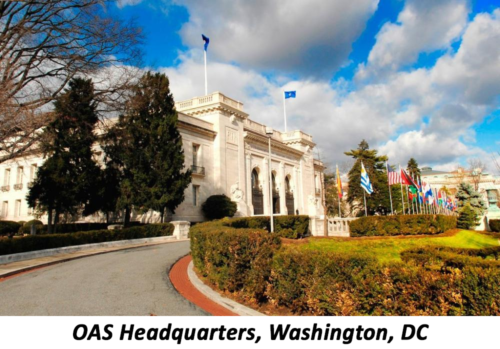Photo: Hon. Dolores Balderamos-Garcia, Minister of Indigenous Peoples’ Affairs
IACHR to hold working meeting on Maya Land Rights case on November 9
BELMOPAN, Monday, Nov. 6, 2023
On October 12, 2004, the Organization of American States’ Inter-American Commission on Human Rights (IACHR) outlined that Maya communities of southern Belize have rights – under the norms of international law – to the land they have traditionally occupied. The IACHR declared in its Merits Report (No. 40/04 of October 2004) that the State of Belize violated the Mayas’ right to property by “failing to take effective measures to recognize their communal property right to the lands that they have traditionally occupied and used, without detriment to other indigenous communities, and to delimit, demarcate and title or otherwise establish the legal mechanisms necessary to clarify and protect the territory on which their right exists.”
Almost two decades after the IACHR merits report, the Maya Leaders Alliance (MLA) as a Petitioner in the Maya Communities V. Belize (Case NO. 12.053) before the IACHR have successfully requested a working meeting of the Commission with the hope of “overcoming obstacles” to the implementation of the recommendations made by the Commission in its Merits Report. The meeting will take place on Thursday, November 9 during the 188th Period of Sessions of the Commission in Washington DC where Commissioners will engage with representatives of the Maya communities of southern Belize and the State. Amandala has learned that Belize will be represented virtually by Deputy Solicitor General Samantha Matute while Belize’s Ambassador to the U.S., H.E. Lynn Young is expected to attend in person.
In the 9-page request submitted by the Petitioner, it reports that Maya communities of the south still “do not have secure land tenure, and they remain vulnerable to ongoing incursions on their traditional lands amid rising tensions that at times have threatened to erupt into violence.” They explain that they believe the Commission can guide the State “on the nature of its relevant international human rights obligations” regarding Maya land rights and how to secure them and also assist with how to prevent further incursions into Maya land. The Petitioner states, “A working meeting with the Commission could help to bring the State to adopt and publicly advance a posture that is in fact conducive to securing Maya land rights in accordance with its international human rights obligations.”

The Case of the Maya Communities of the Toledo District resulted from the Government’s award of logging and oil concessions to third parties on Maya communal land without proper consultation and consent of the Maya people.
Notably, the Commission in its Merits Report 40/04 had also recommended that the Government “abstain from any acts that might lead the agents of the State itself, or third parties acting with its acquiescence or its tolerance, to affect the existence, value, use, or enjoyment of the property located in the geographic area occupied and used by the Maya people” and to repair environmental damage that resulted from the logging concessions granted.
The Petitioner likewise narrates the developments that unfolded since the Merits Report of 2004 including the judgment and Consent Order of the Caribbean Court of Justice on Maya Land Rights that respectively “recognized Maya communal land tenure as a form of property protected by the Constitution of Belize” and “required Belize to adopt legislation and other measures, in consultation with the Maya people, to secure Maya customary land tenure.”
The CCJ judgment and Consent Order are in line with the findings and recommendations of the IACHR which are also yet to be complied with. The Petitioner reported to the Commission in 2022 that they had eventually succeeded in reaching an agreement with the State in 2018 on a framework to cooperatively implement the CCJ Consent Order which would also facilitate the implementation of the recommendations of the IAHCR’s report. They note, however, that the new government that took power in 2020 abandoned that agreement “and the results obtained under it.” Among those results they cite progress toward consensus on a Free, Prior and Informed Consent (FPIC) Protocol, a Maya Customary Land Tenure Policy, a methodology for land delimitation and a joint procedure for the drafting of legislation. They share, “The current government has not only retracted most of the previous commitments, but it has begun to unilaterally adopt and dissipate new and conflicting versions of the documents previously created in agreement with the Maya communities’ representatives, the MLA and TAA.” According to the Petitioner, the State has also been slow in responding or has neglected to respond to their written communication commenting on documents that the government unilaterally adopted including the FPIC protocol.
The Petitioner expresses that the State is no longer of the view that it needs to engage directly with the MLA and TAA which they describe as the umbrella organizations of the Maya communities of southern Belize, and as such, there are no longer any regular meetings with the MLA and TAA. Instead, says the Petitioner, the Government is choosing to consult directly with individual Maya villages as the MLA and TAA “resist imposition by the government of its own narrow view of the scope of Maya land rights.” The MLA and TAA cite a letter dated May 5, 2023 from the Government’ attorney in the case, Senior Counsel Andrew Marshalleck, where he tells them that the Government will be offering “no further opportunity for grandstanding on the part of any effort to impose upon it or the general public the will of a few with ill-conceived notions and/or special interests.” Pointing to the American Declaration on the Rights of Indigenous Peoples, the Petitioner says the State is in violation of the principle that it shall “consult and cooperate in good faith with the indigenous peoples concerned, through their own representative institutions, in order to obtain their free, prior and informed consent before adopting and implementing legislative or administrative measures that may affect them.”
Focusing specifically on the FPIC protocol, the Petitioner says it is flawed because “it fails to require the government to notify the TAA as representative of all the Maya communities when an FPIC process is to be commenced, it unilaterally mandates the procedures and timing of Maya community decision making, and it does not require the government to notify, much less consult with, Maya communities about measures affecting Maya lands in cases of emergency.” The MLA and TAA report that the Government is now using its FPIC protocol “to advance its projects on Maya lands.” Speaking also about the draft Maya Customary Land Tenure Policy, the Petitioner declares that the draft “sets out to disapply FPIC requirements for projects for “national security, national health, national infrastructure or necessary for the exploitation of mineral or petroleum resources.” The Petitioner views such a wide exception as betraying the spirit and letter of the IAHCR’s 40/04 report and as an affront to Belize’s international human rights obligations given that “these types of projects have a great potential to adversely impact Maya people and Maya customary land tenure as a whole.” The Petitions affirm that the American Declaration on the Rights of Indigenous Peoples and other instruments do not allow for such exceptions. The Petitioner draws from the draft policy a specific concerning provision which speaks to proposed constitutional amendments that “shall be designed to support national legislation giving effect to the foregoing principles and objectives by limiting so far as is necessary the protection afforded to rights conferred by Maya Customary Land Tenure including specifically, but not limited to, any right to relief for any abrogation of or derogation from any such right of sufficiently long standing.” The Petitioner accuses that, for the Government to consider that Maya land rights are mere “usufructuary rights” which only partially include ownership rights ordinarily accorded property rights in land, is to continue the “racially discriminatory government posture toward Maya customary land tenure that the Commission condemned in its merits report and, again, is incompatible with the States’ international human rights obligations.”
In their request to the Commission for a working meeting, the Petitioner additionally speaks to ongoing incursions, specifically tensions that have persisted this year between Yemeri Grove and Laguna, and government-fuelled threats which they affirm “downplay or express hostility toward” Maya land rights.

